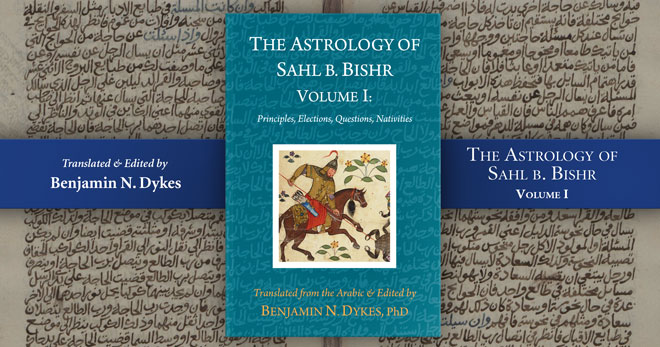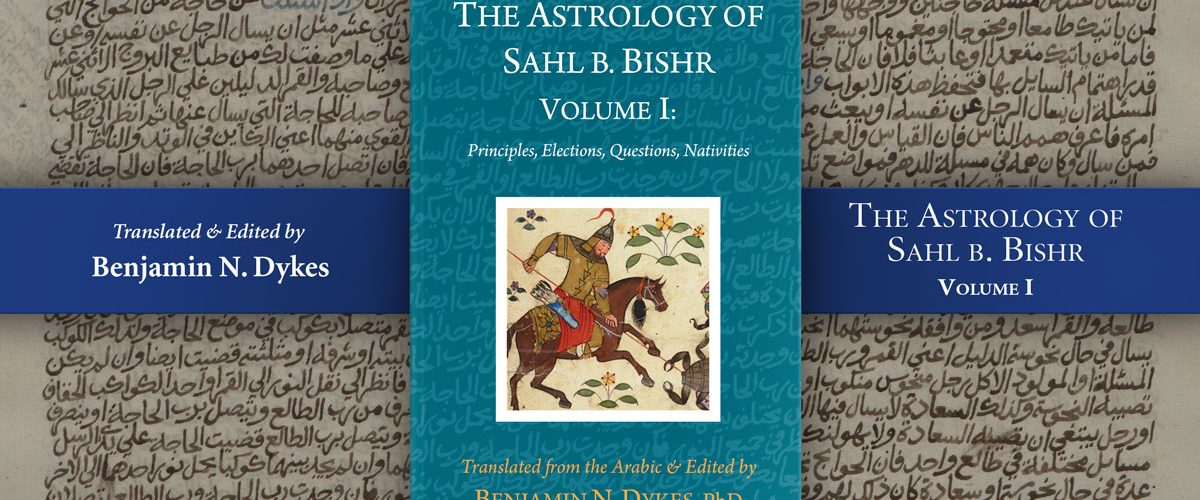
Episode 198 features an interview with Benjamin Dykes about his new translation of the works of the 9th century astrologer Sahl ibn Bishr from Arabic.
Sahl was part of the second generation of astrologers who wrote in Arabic and worked in Baghdad during the early Islamic Caliphate.
He seems to have been active around 815–825 CE, and wrote what became some of the foundational works on Medieval astrology.
Ben just published a compilation of Sahl’s works on natal, electional, and horary astrology titled The Astrology of Sahl B. Bishr, Vol. I: Principles, Elections, Questions, Nativities.
The centerpiece of this volume is a huge treatise on natal astrology, which contains some of the earliest and most extensive interpretations of the rulers of the houses when they are in different houses, as well as interpretations for different Lots or Arabic Parts.
Here is the full book description from Ben:
The influential medieval astrologer Sahl b. Bishr was at the center of Baghdad politics and conflict during key years of the ‘Abbasid Caliphate, in the early 800s. In this volume, leading astrological translator Benjamin Dykes presents six of his most important works, translated from the Arabic originals into English, including his major Book on Nativities for the first time. Texts here include the Introduction, The Fifty Aphorisms, On Questions, On Choices, On Times, On Nativities, and The 66 Sections. The Book on Nativities draws most heavily on the Persian al-Andarzaghar, with extensive passages from Dorotheus, Rhetorius, excerpts from Nawbakht the Persian, the Bizidaj, and others. Of special note are lengthy reproductions of Māshā’allāh’s Treatise on Lots, portions of a book on nativities, the lords of the houses in the houses, the lord of the Ascendant in combination with others, and more.
The book was just released for sale today on Amazon to coincide with this interview:
The Astrology of Sahl B. Bishr, Volume I on Amazon
(While Amazon currently says that it ships in 1 to 3 months, orders placed now should be shipped within the next week.)
Below you will find the episode notes, which contains an outline of some of the major points we touched on in the discussion, followed by links to listen to the recording.
This episode is available in both audio and video versions below.
Episode Notes
Here is an outline of some of the points touched on in this episode:
- Ben’s first appearance on the podcast was on episode 2 back in 2012.
- To promote his book on electional astrology titled Choices and Inceptions.
- Ben has published 18 books over the past decade.
- Largely translations from Latin, Arabic, and Greek.
- He took Latin in high school, and started by translating Guido Bonatti.
- His second book was Works of Sahl and Masha’allah in 2008.
- Masha’allah and Sahl wrote in Arabic in the late 8th and early 9th centuries
- Bio/times of Sahl and Masha’allah.
- Sahl’s period of activity was around 815–825 CE.
- Sahl’s connection to Buran of Baghdad through her father.
- Their texts were later translated into Latin around the 12th century
- Later astrologers like William Lilly in the 17th century drew on these Latin translations
- Originally Ben translated Sahl and Masha’allah from the Latin versions.
- In the early 2010s Ben decided to learn Arabic
- Wanted to go back to the original texts.
- First published Arabic translation was Dorotheus of Sidon
- This is his second published translation from Arabic
- It is a huge 800 page book
- About the book
- Compilation of several works of Sahl translated from Arabic
- Separate texts on natal astrology, horary, elections, and more.
- New translations of some works translated from Latin previously
- Important because it turns out the Latin versions had changes made
- The language is much richer in Arabic, and surprisingly close to the Greek
- Chris was surprised at how well the Arabic terms matched the Greek
- The most important and longest text is On Nativities
- One of the most comprehensive treatments of natal astrology
- Draws on a number of Greek, Persian, and Arabic sources
- Has a lot of cool delineation material on the rulers of the houses.
- Earliest complete set of delineations for house rulers.
- Rhetorius from the 6th century is incomplete.
- Other interesting points:
- Sahl drew heavily on Rhetorius, via Al-Andarzaghar
- New Māshā’allāh texts embedded in Sahl.
- Possible solution to whole sign houses and quadrant houses issue
- The use of both is taken for granted by Sahl
- He has special terms used when referring to one or the other
- Interesting passage about zodiac sign cusps in Sahl.
- Definition of the void of course Moon.
- Other projects and translations Ben is working on.
- Forthcoming translation of Abu Ma’shar.
- Preparing a course on Medieval natal astrology
- Sahl will be one of the primary texts for that course.
Watch the Video Version of This Episode
Here is the video version of my interview with Benjamin Dykes:
–
Transcript
A full transcript of this episode is available: Episode 198 transcript
Listen to the Audio Version of This Episode
You can play this episode of the podcast directly from the website or download it as an MP3 to your computer by using the buttons below:
Podcast: Play in new window | Download (Duration: 1:57:47 — 81.2MB)


As a former student of Latin based languages I find Mr Dyke’s work fascinating and critcal. So much lost w each translation. Some languages not going from one to the next not very accurate. I believe Greek may be one that is “flat” and not as nuanced? Good to see the Arabic as first source. Now to do the astrology w yet more new rules! I wonder, which quadrant system they were using and when. Great interview.
Another wonderful podcast here!
Always among of the best episodes. The interviews with Ben never fail to enlighten. I would love to see a translation of Valens from Ben. Add in one his excellent introductory chapters; it would surely go down as the definitive Valens volume.
Thanks. Very educational about that period. Mr Dykes seems to be a translation movement all on his own!
Always a pleasure to listen to Benjamin Dykes. I wanted to ask Dr Dykes if the natal course he plans to offer will be available online or will it be open only to students locally.
Many thanks!
I have the same question. I hope someone answers it.
It was be a correspondence course, I believe.
The concept of ‘no reception’ or a planet taking another planet into its debility has been used by John Frawley for a long time, especially in horary. A general way to look at it is, a planet in Capricorn is either controlled by or ‘loves’ Saturn, that planet exalts Mars and what or whomever Mars represents, it is detrimental to/dislikes whatever the Moon represents and looks down on or is dismissive of whatever/whomever Jupiter represents. And so the rest to paraphrase Lilly.